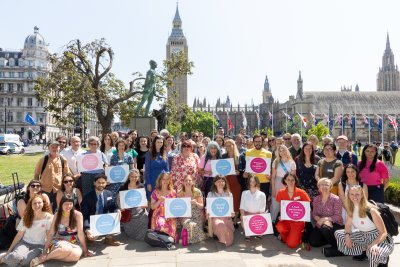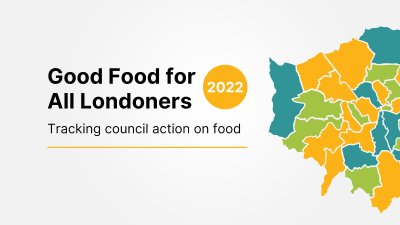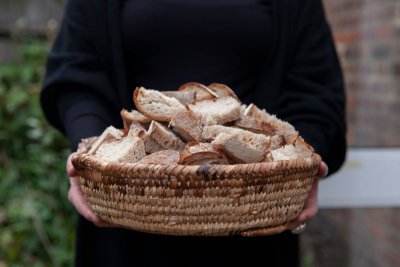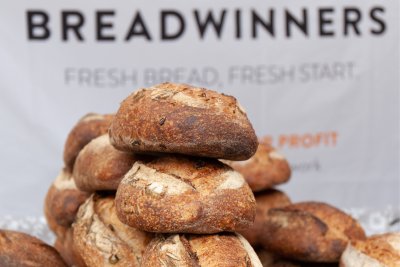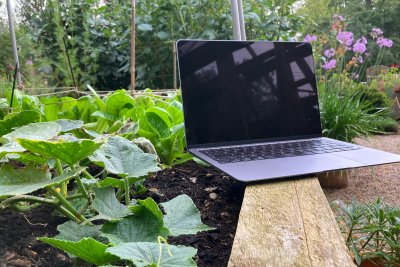Rosie Boycott calls on London boroughs to do more to support breastfeeding
Rosie Boycott, journalist and chair of the London Food Board , well known for having founded feminist magazine Spare Rib, has joined with food campaign group London Food Link and the UNICEF UK Baby Friendly Initiative in calling on London councils to do more to support new mums and increase the prevalence of breastfeeding in the capital.
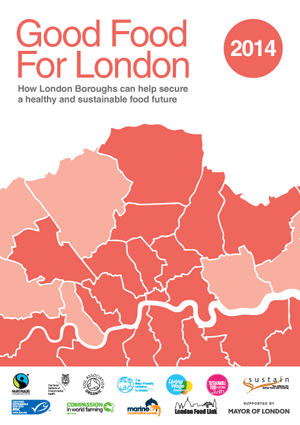 Rosie Boycott, journalist and chair of the London Food Board [1], well known for having founded feminist magazine Spare Rib, has joined with food campaign group London Food Link and the UNICEF UK Baby Friendly Initiative [2] in calling on London councils to do more to support new mums and increase the prevalence of breastfeeding in the capital.
Rosie Boycott, journalist and chair of the London Food Board [1], well known for having founded feminist magazine Spare Rib, has joined with food campaign group London Food Link and the UNICEF UK Baby Friendly Initiative [2] in calling on London councils to do more to support new mums and increase the prevalence of breastfeeding in the capital.
Rosie Boycott explained, “We are calling on all London borough councils to introduce the UNICEF UK Baby Friendly Initiative for all the community services they run. This programme should ensure that all parents make informed decisions about feeding their babies and are supported in their choice.”
17 of London’s 33 boroughs are running the UNICEF programme in some services [3], six of which demonstrate stronger leadership achieving the full Baby Friendly accreditation for their health visiting services.
Sue Ashmore, Director of UNICEF UK Baby Friendly Initiative explained “Breastfeeding has a range of health benefits for both mothers and babies. Breastfed children are less likely to suffer from digestive disorders, respiratory and ear infections, diabetes and allergies, as well as being less likely to be obese in later life. For the mother breastfeeding reduces the risk of some cancers, including breast cancer. We are concerned that the current divide in the capital means that not all mothers are receiving the same high standard of care and support.”
The UNICEF initiative is one of nine measures [4] reflected in the Good Food for London 2014 [5] borough league table, published today by London Food Link and backed by an alliance of organisations working to improve London’s food.
The league table is topped overall for the fourth consecutive year by Islington (stage 2 achieved in Baby Friendly), who continue to demonstrate strong leadership to improve food in the borough, including this year achieving the Gold Food for Life Catering Mark standard for school meals. Leadership on several key food issues was also demonstrated by Tower Hamlets, Greenwich, Lewisham, Camden, Merton, Enfield, Kensington & Chelsea and Lambeth. However Wandsworth and Bromley came joint bottom of the table achieving a total score of 0.5 out of a possible 10.5.
Ross Compton, the author of the report, said, “The London borough league table shines a light on local authorities taking straightforward and significant steps to improve food in their borough, as well as highlighting those lagging behind. We are pleased to see that the support from London’s councils is increasing across the board for these food initiatives. Increased engagement from many boroughs has meant that despite the cuts, many more councils have found ways to continue to offer residents better food and support a fairer food system. If we are to achieve the change necessary to turn the tide on diet related ill health then we must see changes at all life stages. We are delighted to join with UNICEF UK Baby Friendly Initiative in calling on all London boroughs to ensure the best start for every infant in London. Councils care most about what their residents think, which is why we are inviting Londoners to use our online tool to call on their council to commit to achieving full baby Friendly accreditation.”[7]
Londoners can use our online tool to call on their borough to ensure the best start for every infant by introducing the UNICEF UK Baby Friendly Initiative. http://bit.ly/LFLaction
Full report, Good Food for London 2014: View our online interactive league table and download the report.
Notes to editors
1) The London Food Board is an advisory group of independent food policy organisations and experts which oversees the implementation of The Mayor’s Food Strategy: Healthy and Sustainable Food for London, published in 2006, and to co-ordinate work and lead the debate on sustainable food issues in the Capital. Rosie Boycott is chair of the London Food Board. See: www.london.gov.uk/priorities/business-economy/working-in-partnership/london-food-board/london-food-board
2) The UK Baby Friendly Initiative is based on a global accreditation programme of UNICEF and the World Health Organization. It is designed to support breastfeeding and parent infant relationships by working with public services to improve standards of care. See: www.unicef.org.uk/BabyFriendly
3) In this year’s Good Food for London league table councils are recognised for working towards the Baby Friendly accreditation for health visiting and public health nursing. In 2015 the measure will be extended to reflect the rollout of the programme to children’s centres.
4) The nine key food issues surveyed in the Good Food For London report are:
UNICEF UK Baby Friendly Initiative: The initiative recognises services that support mothers who have chosen to breastfeed, to do so for as long as they wish, and encourage all mothers regardless of feeding method to develop close and loving relationships with their babies. Implementing the Baby Friendly standards will help to ensure good quality support is available, across the community, for all mothers and babies. 17 of London’s 33 boroughs are engaged with the programme, with six of the boroughs’ health visiting services having achieved full Baby Friendly accreditation. See: www.unicef.org.uk/babyfriendly
Community food growing: London Borough commitment to the Capital Growth campaign, backed by the Mayor of London, Sustain and the Big Lottery. Over 2,000 new community food growing spaces have already been created, with 23 Boroughs having committed to continue to support the work of Capital Growth and 21 having recognised community food growing in council planning policy. See: www.capitalgrowth.org
The London Living Wage: The Living Wage Foundation believes that work should be the surest way out of poverty; this can only be achieved when wages reflect the basic cost of living in London. Food poverty is the symptom of a number of contributing factors, financial access being an important element. Paying the Living Wage and promoting that employers within the borough do likewise is an important way of tackling the issue. 11 London boroughs are accredited Living Wage employers. See: www.livingwage.org.uk
Fairtrade food: Fairtrade guarantees a better income for food producers in poor countries. London Boroughs can buy and promote Fairtrade food, to help tackle global poverty, and 24 out of London’s 33 Boroughs now have Fairtrade status, however 5 are overdue in renewing their Fairtrade status. See: www.fairtradelondon.org.uk
Food for Life in schools: The Food for Life Partnership helps schools improve food quality, education and introduce food growing, with proven benefits for children’s health and educational attainment. The Food for Life Catering Mark works with caterers to improve food standards, and 20 London Boroughs so far have achieved a Bronze Catering Mark or higher, with 5 impressively going on to achieve a Gold award: Camden, Islington, Kensington & Chelsea, Merton and Richmond upon Thames. See: www.soilassociation.org/cateringmark
Sustainable Fish City: 19 out of 33 boroughs are taking at least one significant step to help save marine life and ocean ecosystems. 6 local authorities have scored top marks; Camden, Greenwich, Islington, Tower Hamlets, Waltham Forest and Westminster. A significant step includes signing the Sustainable Fish Cities pledge on behalf of primary schools, secondary schools and other council catering services. The pledge commits boroughs to developing and implementing a simple sustainable fish policy, which includes serving MSC Certified fish, and/or fish from the MCS Fish to Eat list wherever possible. See: www.sustainablefishcities.net
Good Farm Animal Welfare Awards: Run by Compassion in World Farming, these awards celebrate commitments by food companies and local authorities to buying higher welfare eggs, meat and dairy produce. 17 London boroughs have achieved a Good Egg Award for using cage-free eggs, and one borough, Islington, is the first to receive a Good Chicken Award, adding to its existing Good Egg Award. See: www.compassioninfoodbusiness.com/awards
Healthier Catering Commitment: This initiative has been designed by environmental health teams with support from primary care trusts (PCTs), the Chartered Institute of Environmental Health (CIEH) and the Greater London Authority. It offers practical advice to food outlets to make food healthier. The scheme is promoted by environmental health teams and PCTs, with 25 London Boroughs participating in this or something to a similar standard: www.ciwf.org.uk/our-impact/foodbusiness-programme/good-farmanimal-welfare-awards
Local food partnerships: These are partnerships where public agencies, NGOs, businesses and communities are taking a joined up approach to food issues within a borough, making healthy and sustainable food a defining characteristic of where they live. 3 boroughs have an established partnership with the involvement of the local authority, a further 11 boroughs are undertaking initial consultations. See: http://sustainablefoodcities.org
5) The Good Food for London 2014 report is published by London Food Link (www.londonfoodlink.org), part of the charity Sustain. London Food Link is a network of people and organisations working to promote healthy and sustainable food for London and is backed by an alliance of organisations working to improve London’s food. These organisations include: UNICEF UK Baby Friendly Initiative, the Living Wage Foundation, the Chartered Institute of Environmental Health, the Soil Association, Fairtrade London, the Marine Stewardship Council, the Marine Conservation Society, Compassion in World Farming, Sustainable Food Cities, Sustain, members of the London Food Board and the Chair of the London Food Board, Rosie Boycott.
View our online interactive league table and download the Good Food for London 2014 report at www.sustainweb.org/londonfoodlink/goodfoodforlondon2014
6) London Boroughs were assessed for their involvement in the nine good food schemes listed above and what they have achieved through their participation: 10.5 points were available for full participation in all 9 schemes listed, with half-marks available for showing good or excellent progress.
One point is awarded for achieving the top award for community food growing, London Living Wage, Fairtrade food, animal welfare, healthier catering and local food partnerships. 1.5 points are awarded for achieving the top award for the UNICEF UK Baby Friendly Initiative, Food for Life in schools and sustainable fish.
See: www.sustainweb.org/londonfoodlink/goodfoodforlondon2014:
- Islington came top for the fourth consecutive year (with 10 points out of a possible 10.5)
- “Making excellent progress” were Tower Hamlets (9 points), Greenwich (8), Lewisham (8), Camden (7.5) Merton (7), Enfield (6.5), Kensington and Chelsea (6) and Lambeth (6).
- “Falling out of their previous leadership position” are Richmond-upon Thames (5) and Waltham Forest (5.5).
- “Lagging behind” were Bromley (0.5) and Wandsworth (0.5)
- All other London Boroughs scored between 1 and 4.5 out of a total possible 10.5 points.
Published Thursday 16 October 2014
London Food Link: London Food Link brings together community food enterprises and projects that are working to make good food accessible to everyone in London to help create a healthy, sustainable and ethical food system for all.
